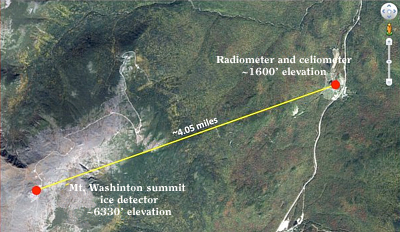New Hampshire NASA EPSCoR
Current Project
Icing Assessments in Cold and Alpine Environments
This study looks at icing in the complex terrain and meteorology of the Presidential Range of northern NH. The project requires development of tools and techniques to model ice accretion in cold alpine environments.
The researchers are locating ice detectors and radiometers at facilities in New England, which will then provide icing data for validation of forecast models.
The ice detectors provide an estimate of supercooled liquid water content (SLWC) within a swept volume of cloud. Because glaciated frozen component is not measured with ice detectors, microwave radiometers are used to provide an indication of the volume of water, frozen and liquid, within a cloud.
 |
| Icing detectors and microwave radiometer locations on Mt. Washington. |
The initial icing detectors and radiometers for this study are located on Mt. Washington and the nearby Mt. Washington Cog Railway and Mt. Washington Auto Road. An additional measurement site atop Mt. Mansfield, Vt., was chosen as a location high enough to experience frequent icing and yet far enough from Mt. Washington to validate icing models over a larger area.
Data retrieval from the sites is fully automated. The remaining year of this project will focus on analyzing data and refining models for making accurate forecasts.
 |
|
| Prof. James Koermer |
Plymouth State University Professor James Koermer is conducting this study in partnership with the Army Corps of Engineers U.S. Cold Regions Research and Engineering Laboratory (CRREL) in Hanover, New Hampshire. National Ctr. for Atmospheric Research is collaborating on modeling.
The collaboration between Plymouth State Univ. and Mt. Washington Obs. has led to a joint PSU-MWO position supporting the meteorology research while mentoring undergraduate and graduate students on joint research.
